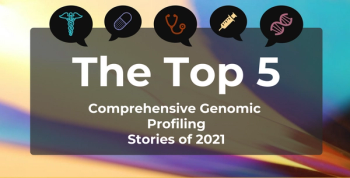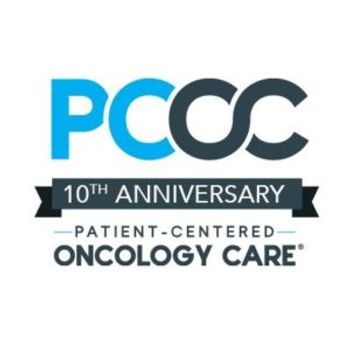
Comprehensive Genomic Profiling
Latest News

Latest Videos

CME Content
More News

Response to immunotherapy and survival outcomes were found to be significantly associated with tumor mutational burden in patients with stage IV non-small cell lung cancer.

The rise in popularity of genetic testing brings along a myriad of challenges ranging from concerns on data privacy to insurance coverage, but, when utilized correctly, it could mark a step forward for significant advancements in individual and population health.

Megan Olsen, MPH, principal at Avalere, provides a comprehensive overlook into the many ways that the COVID-19 pandemic has impacted the cell and gene therapy space.

Findings presented at the 2022 ASCO Gastrointestinal Cancers Symposium showed no significant differences in tissue and plasma genomic profiles of patients with early-onset and late-onset colorectal cancer, but a greater enrichment of the BRCA1 and PTEN mutations were noted in the tissue of those with early-onset disease.

The frequency of several mutations that inhibit response to tyrosine kinase inhibitors and tend to lead to increased disease severity was elevated in Chinese patients with non-small cell lung cancer.

Prior to receiving therapy for non–small cell lung cancer (NSCLC), some patients' results may require analysis beyond comprehensive genomic profiling (CGP).

An increase in the use of comprehensive genomic profiling among patients with advanced non–small cell lung cancer (NSCLC) was associated with additional life-years gained and a low-cost budget impact.

Posters from the Academy of Managed Care Pharmacy Nexus 2021 meeting detailed how coverage of genetic testing aligns with current guidelines as well as the potential budget impact of expanding access to comprehensive genomic profiling (CGP).

Human papillomavirus surrogate marker p16 was identified as a potential prognostic biomarker for standard-of-care immune checkpoint blockade therapy response in non-oropharyngeal head and neck squamous cell carcinoma.

Megan Olsen, MPH, principal at Avalere, discusses the role that value assessments are expected to play in the future pricing of gene and cell therapies.

The top 5 most-read comprehensive genomic profiling articles of 2021 on AJMC.com largely focused on the use of liquid biopsy and how biomarkers can offer providers new ways to help predict treatment-related outcomes and identify therapeutic targets.

During the discussion of disparities in cancer care, one panelist explained that the National Institutes of Health definition of precision medicine is broader than most people realize.

Megan Olsen, MPH, principal at Avalere, discusses how the impact of small patient populations and other limitations may influence payer conversations about gene and cell therapies.

Next-generation sequencing (NGS) may be a helpful tool for establishing how B cells migrate and maturate across the blood-brain barrier in multiple sclerosis (MS), potentially providing better insight into the pathophysiologic mechanisms involved in neuro-inflammation.

Cell-free circulating tumor DNA (cfDNA)–based tumor genotyping was found to be noninferior to standard-of-care tissue-based genotyping for detection of guideline-recommended biomarkers and therapeutic outcomes in patients with advanced nonsquamous non–small cell lung cancer (NSCLC).

The FDA approved FoundationOneCDx as the first companion diagnostic for current and future BRAF inhibitor therapeutics used to treat melanoma, including both monotherapies and combination therapies.

Processes used to identify and understand genetic markers detailing the prognosis and responsiveness to therapy in adrenocortical carcinoma (ACC) face a number of implementation barriers, limiting the potential for individualized ACC management.

Next-generation sequencing uncovered 3 subtypes of epidermal growth factor receptor–mutant stage 2 and 3 non–small cell lung cancer (NSCLC) that predicted patient outcomes to adjuvant therapy.

Funmi Olopade, MD, FACP, professor of medicine and human genetics and founding director of the Center for Clinical Cancer Genetics and Global Health at the University of Chicago Medical Center, explains how transgender women are included in breast cancer research and emphasizes why it is important to include all women.

Next-generation sequencing (NGS) and the use of prediction tools in 2 patients with a rare form of metastatic breast cancer revealed mutations in malignant phyllodes tumors that are often detected in other advanced cancers, providing insight into potential therapeutic targets for these patients.

The high cost of specialty drugs makes it important to use companion diagnostics and other tests to make sure the drug is going to the right patient, said George Van Antwerp, MBA, managing director, Deloitte Consulting.

Using cell cultures from pediatric patients with neuroblastoma, researchers performed drug-response testing and investigated correlations between copy number and cytotoxicity of drug treatment.

Genetic profiling in recurrent and advanced breast cancer can yield actionable, smoking-gun biomarkers, Stanford Cancer Institute pathologists explained at the National Comprehensive Cancer Network 2021 Virtual Congress: Biomarkers in Solid Tumors.

A recent survey of oncologists in Australia showed that while most are integrating comprehensive genomic profiling (CGP) into their practice, they lack a high level of confidence to communicate findings and to adjust patient treatment accordingly.

A discussion at the National Comprehensive Cancer Network 2021 Virtual Congress: Biomarkers in Solid Tumors addressed the advantages and considerations for broad and targeted genomic profiling in oncology.














